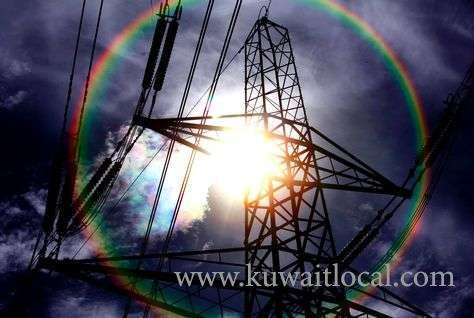Latest News
- IMF And World Bank Align On Kuwait's Economic Growth
- Nepalese Domestic Worker Commits Suicide
- Traffic Light Labeling For Packaged Foods Unveil By Kuwait
- Nazaha Unveils 49 Forged Certificates In 5 Years
- One Injured And Two Killed In An Abdali Road Accident
- Finance Ministry Approves ‘Afiya 4’ Health Insurance Tender With...
- KOC Clinches 63 Rig Contracts Worth $670 Million
- MoE Approves 169 Committees To Test 40,000 High School Students...
- Municipality Launches Campaign Against Unauthorized Car Awnings...
- Civil Service Commission Observes 170 Violations Across Ten Gove...
- Ministry Of Trade And Industry Cracks Down On Grill Pan Weight T...
- Ministry Of Health Considers Fingerprint System For Primary Heal...
The Gcc Power Sector Requires 137 Billion Of Investment To Fuel Power Sector

The GCC power sector requires $137 billion of investment over the next five years to cope with rising demand, a new report claims.
Capacity in the region needs to expand at an average annual pace of 8 percent between 2016 and 2020. This will require an estimated $85 billion for the addition of 69 gigawatt (GW) of generating capacity and a further $52 billion for transmission and distribution, the report by construction research firm Ventures Onsite states.
The report forecasts a 14 percent year-on-year increase in GCC power construction contractor awards in 2017.
The total value of contracts awarded is set to increase from $22.381 billion in 2016 to $25.523 billion in 2017, the report says.
Saudi Arabia is expected to register the highest contractor awards in 2017, at around $12.34 billion, an increase of over 50 percent from its 2016 figure.
The report predicts the value of power construction contract awards will also significantly increase in Bahrain, Kuwait and Oman.
GCC countries are set to invest a total of $252 billion over the next five years in projects for setting up new power production plants, distribution systems and supply grids, Ventures Onsite notes.
Many are implementing reforms to the structure of the electricity market – for example, increasing water, electricity and fuel prices to ease the burden on state budgets. This is all part of a broader programme to liberalise domestic energy prices over the medium term, the report adds.
There has also been a growing interest in ‘smart’ power grids that more efficiently produce and distribute power according to immediate demand, thereby reducing stress on grids, cutting emissions and defer investments for upgrades.
Holley Chant, executive director of corporate sustainability at energy consultancy KEO International, said: “The elephant in the room for energy efficiency is the heavily subsidised unit cost of energy within the GCC.
“[A report by] the Abdullah Bin Hamad Al-Attiyah Foundation for Energy & Sustainable Development in November 2015 states that this is as much as 66 percent for some GCC countries.
“Given the promising development of low carbon infrastructural energy generation projects, the hidden costs of subsidized energy are reducing.
“Nonetheless, addressing this difference would be the strongest incentive. Since utility costs are rising, a clear road map of future financial impacts would further support this stimulus.”
SOURCE : ARABIANBUSINESS
Trending News
-
 Eid Al Fitr 2024: Crescent Moon Not Sighted In Sau...
08 April 2024
Eid Al Fitr 2024: Crescent Moon Not Sighted In Sau...
08 April 2024 -
 Kuwait Implements Home Biometrics Services Ahead O...
14 April 2024
Kuwait Implements Home Biometrics Services Ahead O...
14 April 2024 -
 When Will Eid Al Fitr 2024 Take Place In Qatar, Ba...
08 April 2024
When Will Eid Al Fitr 2024 Take Place In Qatar, Ba...
08 April 2024 -
 On Sunday, The Meteorological Department Warns Of...
07 April 2024
On Sunday, The Meteorological Department Warns Of...
07 April 2024 -
 Kuwait Airways Provides Update On Flight Schedule...
14 April 2024
Kuwait Airways Provides Update On Flight Schedule...
14 April 2024 -
 Winners Of Kuwait National Assembly 2024 Elections
06 April 2024
Winners Of Kuwait National Assembly 2024 Elections
06 April 2024 -
 Kuwait Airways Introduces Convenient Home Luggage...
15 April 2024
Kuwait Airways Introduces Convenient Home Luggage...
15 April 2024 -
 Gathering For Eid Al-Fitr Prayers: Kuwaiti Citizen...
10 April 2024
Gathering For Eid Al-Fitr Prayers: Kuwaiti Citizen...
10 April 2024 -
 Transforming Kuwait's Public Transport: The Digita...
07 April 2024
Transforming Kuwait's Public Transport: The Digita...
07 April 2024 -
 An Egyptian Expat Dies At Kuwait's Airport
11 April 2024
An Egyptian Expat Dies At Kuwait's Airport
11 April 2024












Comments Post Comment